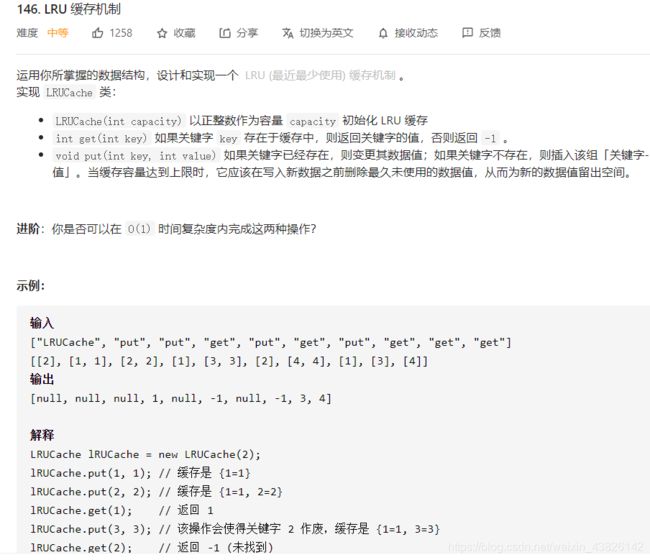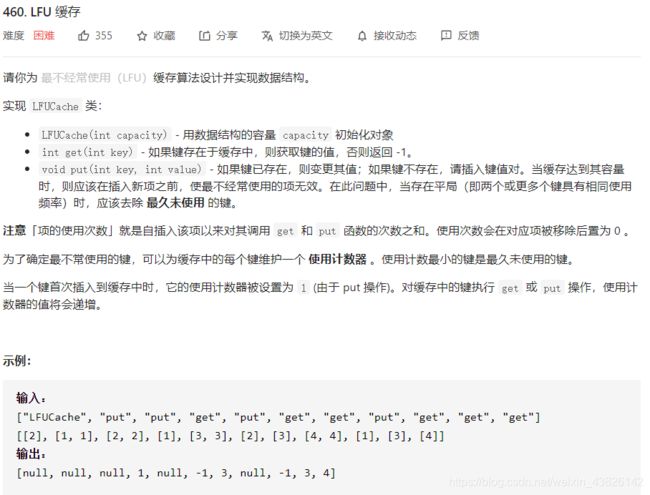- guava loadingCache代码示例
IM 胡鹏飞
Java工具类介绍
publicclassTest2{publicstaticvoidmain(String[]args)throwsException{LoadingCachecache=CacheBuilder.newBuilder()//设置并发级别为8,并发级别是指可以同时写缓存的线程数.concurrencyLevel(8)//设置缓存容器的初始容量为10.initialCapacity(10)//设置缓存
- 【LeetCode 热题 100】24. 两两交换链表中的节点——(解法一)迭代+哨兵
xumistore
LeetCodeleetcode链表算法java
Problem:24.两两交换链表中的节点题目:给你一个链表,两两交换其中相邻的节点,并返回交换后链表的头节点。你必须在不修改节点内部的值的情况下完成本题(即,只能进行节点交换)。文章目录整体思路完整代码时空复杂度时间复杂度:O(N)空间复杂度:O(1)整体思路这段代码旨在解决一个经典的链表操作问题:两两交换链表中的节点(SwapNodesinPairs)。问题要求将链表中每两个相邻的节点进行交换
- Guava LoadingCache
sqyaa.
java并发编程Java知识jvm缓存guava
LoadingCache是GoogleGuava库提供的一个高级缓存实现,它通过自动加载机制简化了缓存使用模式。核心特性自动加载机制当缓存未命中时,自动调用指定的CacheLoader加载数据线程安全:并发请求下,相同key只会加载一次灵活的过期策略支持基于写入时间(expireAfterWrite)和访问时间(expireAfterAccess)的过期可设置最大缓存大小,基于LRU策略淘汰丰富的
- Leetcode 148. 排序链表
文章目录前引题目代码(首刷看题解)代码(8.9二刷部分看解析)代码(9.15三刷部分看解析)前引综合性比较强的一道题,要求时间复杂度必须O(logn)才能通过,最适合链表的排序算法就是归并。这里采用自顶向下的方法步骤:找到链表中点(双指针)对两个子链表排序(递归,直到只有一个结点,记得将子链表最后指向nullptr)归并(引入dummy结点)题目Leetcode148.排序链表代码(首刷看题解)c
- LeetCode 148. 排序链表:归并排序的细节解析
进击的小白菜
2025Top100详解leetcode链表算法
文章目录题目描述一、方法思路:归并排序的核心步骤二、关键实现细节:快慢指针分割链表1.快慢指针的初始化问题2.为什么选择`fast=head.next`?示例1:链表长度为偶数(`1->2->3->4`)三、完整代码实现四、复杂度分析五、总结题目描述LeetCode148题要求对链表进行排序,时间复杂度需为O(nlogn),且空间复杂度为O(logn)。由于链表的特殊结构(无法随机访问),归并排序
- 算法学习笔记:17.蒙特卡洛算法 ——从原理到实战,涵盖 LeetCode 与考研 408 例题
在计算机科学和数学领域,蒙特卡洛算法(MonteCarloAlgorithm)以其独特的随机抽样思想,成为解决复杂问题的有力工具。从圆周率的计算到金融风险评估,从物理模拟到人工智能,蒙特卡洛算法都发挥着不可替代的作用。本文将深入剖析蒙特卡洛算法的思想、解题思路,结合实际应用场景与Java代码实现,并融入考研408的相关考点,穿插图片辅助理解,帮助你全面掌握这一重要算法。蒙特卡洛算法的基本概念蒙特卡
- 算法学习笔记:15.二分查找 ——从原理到实战,涵盖 LeetCode 与考研 408 例题
呆呆企鹅仔
算法学习算法学习笔记考研二分查找
在计算机科学的查找算法中,二分查找以其高效性占据着重要地位。它利用数据的有序性,通过不断缩小查找范围,将原本需要线性时间的查找过程优化为对数时间,成为处理大规模有序数据查找问题的首选算法。二分查找的基本概念二分查找(BinarySearch),又称折半查找,是一种在有序数据集合中查找特定元素的高效算法。其核心原理是:通过不断将查找范围减半,快速定位目标元素。与线性查找逐个遍历元素不同,二分查找依赖
- LeetCode算法题:电话号码的字母组合
吱屋猪_
算法leetcodejava
题目描述:给定一个仅包含数字2-9的字符串,返回所有它能表示的字母组合。答案可以按任意顺序返回。给出数字到字母的映射如下(与电话按键相同)。注意1不对应任何字母。2->"abc"3->"def"4->"ghi"5->"jkl"6->"mno"7->"pqrs"8->"tuv"9->"wxyz"例如,给定digits="23",返回["ad","ae","af","bd","be","bf","cd
- Leetcode 3604. Minimum Time to Reach Destination in Directed Graph
Espresso Macchiato
leetcode笔记leetcode3604leetcodemediumleetcode双周赛160BFS广度优先遍历最优路径
Leetcode3604.MinimumTimetoReachDestinationinDirectedGraph1.解题思路2.代码实现题目链接:3604.MinimumTimetoReachDestinationinDirectedGraph1.解题思路这一题思路上就是一个广度优先遍历,我们不断考察当前时间点以及位置的情况下,下一个点可行的位置,然后考察最近的时间点能够到达的位置,遍历全部可能
- vue keep-alive标签的运用
keep-alive,想必大家都不会很陌生,在一些选项卡中会使用到。其实,它的作用大概就是把组件的数据给缓存起来。比如果我有一个选项卡,标签一,标签二,标签三。现在,我需要实现,当我在标签一的表单中输入内容后,点击标签二,再回到标签一,表单的内容依然存在。如果按以往的做法,不使用keep-alive,那是不能实现的。然而,我们只需要在选项卡的内容最外层包一个keep-alive标签即可。但这儿有一
- php SPOF
贵哥的编程之路(热爱分享 为后来者)
PHP语言经典程序100题php开发语言
1.什么是单点故障(SPOF)?单点故障指的是系统中某个组件一旦失效,整个系统或服务就会不可用。常见的单点有:数据库、缓存、Web服务器、负载均衡、网络设备等。2.常见单点故障场景只有一台数据库服务器,宕机后所有业务不可用只有一台Redis缓存,挂掉后缓存全部失效只有一台Web服务器,挂掉后网站无法访问只有一个负载均衡节点,挂掉后流量无法分发只有一条网络链路,断开后所有服务失联3.消除单点故障的主
- OKHttp3源码分析——学习笔记
Sincerity_
源码相关Okhttp源码解析读书笔记httpclientcache
文章目录1.HttpClient与HttpUrlConnection的区别2.OKHttp源码分析使用步骤:dispatcher任务调度器,(后面有详细说明)Request请求RealCallAsyncCall3.OKHttp架构分析1.异步请求线程池,Dispather2.连接池清理线程池-ConnectionPool3.缓存整理线程池DisLruCache4.Http2异步事务线程池,http
- LeetCode Hot 100 回文链表
源
leetcode链表算法
给你一个单链表的头节点head,请你判断该链表是否为回文链表。如果是,返回true;否则,返回false。示例1:输入:head=[1,2,2,1]输出:true示例2:输入:head=[1,2]输出:false提示:链表中节点数目在范围[1,105]内0vals;while(head!=nullptr){vals.emplace_back(head->val);head=head->next;}
- Python技能手册 - 模块module
金色牛神
Pythonpythonwindows开发语言
系列Python常用技能手册-基础语法Python常用技能手册-模块modulePython常用技能手册-包package目录module模块指什么typing数据类型int整数float浮点数str字符串bool布尔值TypeVar类型变量functools高阶函数工具functools.partial()函数偏置functools.lru_cache()函数缓存sorted排序列表排序元组排序
- 如何发现 Redis 中的 BigKey?
sevevty-seven
redisbootstrap数据库
如何发现Redis中的BigKey?Redis因其出色的性能,常被用作缓存、消息队列和会话存储。然而,在Redis的使用过程中,BigKey是一个不容忽视的问题。BigKey指的是存储了大量数据或包含大量成员的键。它们不仅会占用大量内存,还可能导致网络延迟、主从同步延迟,甚至在极端情况下引发Redis服务崩溃。因此,有效地发现和处理BigKey对于维护Redis服务的稳定性和性能至关重要。本文将深
- 项目开发日记
框架整理学习UIMgr:一、数据结构与算法1.1关键数据结构成员变量类型说明m_CtrlsList当前正在显示的所有UI页面m_CachesList已打开过、但现在不显示的页面(缓存池)1.2算法逻辑查找缓存页面:从m_Caches中倒序查找是否已有对应ePageType页面,找到则重用。页面加载:从资源管理器ResMgr加载prefab并绑定控制器/视图组件。页面关闭:从m_Ctrls移除,添加
- leetcode_27 移除元素
_不会dp不改名_
#双指针leetcode算法职场和发展
1.题意给定一个数组,把不等于val的元素全部移动到数组的前面来。不需要考虑值为val里的元素。2.题解2.1同向双指针我们利用双指针,慢指针指向下一个插入的位置。而快指针不断向前找到首个不为val的值,找到后将快指针位置值赋给慢指针位置,慢指针右移。当快指针遍历完整个数组时,过程结束。classSolution{public:intremoveElement(vector&nums,intval
- LeetCode第317题_离建筑物最近的距离
@蓝莓果粒茶
算法leetcodelinux算法c#学习pythonc++
LeetCode第317题:离建筑物最近的距离文章摘要本文详细解析LeetCode第317题"离建筑物最近的距离",这是一道图论和广度优先搜索的问题。文章提供了基于多源BFS的解法,包含C#、Python、C++三种语言实现,配有详细的算法分析和性能对比。适合想要提升图论算法能力的程序员。核心知识点:广度优先搜索、图论、矩阵遍历难度等级:困难推荐人群:具有图论基础,想要提升算法能力的程序员题目描述
- C#集合:从基础到进阶的全面解析
阿蒙Armon
C#继续学习c#windowslinux
C#集合:从基础到进阶的全面解析在C#编程中,集合是处理数据集合的核心工具。无论是存储一组对象、实现缓存机制,还是处理复杂的数据结构,都离不开集合的灵活运用。本文将全面深入地探讨C#集合体系,从基础概念到高级技巧,帮助开发者掌握集合的精髓,写出更高效、更优雅的代码。一、集合概述与分类C#集合框架是.NET类库的重要组成部分,它提供了一系列用于存储和操作数据的类和接口。与数组相比,集合具有动态扩容、
- Redis简介之它是啥
财神爷首席大弟子
Redisredis数据库缓存
什么是RedisRedis是一个基于BSD协议的开源数据库,是一个以键值对形式的存储系统Redis常用于消息队列,缓存,会话存储等场景Redis是使用C语言编写使用许可证:BSD许可证是一个开源的宽松的软件许可协议Redis优点性能极高Redis是以高性能著称,可全天24小时达到每秒十万次的读写操作数据类型丰富哈希字符串集合列表有序集合原子性操作原子性操作是指,程序要么不执行,要嘛执行完毕,这种对
- 短剧小程序开发全攻略:从0到1打造爆款内容平台
weixin_lynhgworld
小程序短剧
核心内容:行业趋势分析:短剧市场年增长率超300%,用户规模突破5亿,抖音、快手等平台加速布局。小程序成为短剧分发核心渠道:轻量化、低成本、社交裂变优势显著。开发核心功能模块:内容管理:支持多格式上传、分集管理、标签分类。播放体验优化:弹幕互动、倍速播放、清晰度切换、离线缓存。付费系统:单集付费、会员订阅、广告解锁等多元化盈利模式。社交裂变:分享奖励、邀请排行榜、拼团观影功能。技术实现难点:视频流
- 【鸿蒙实战开发】HarmoneyOS如何添加首选项功能
「已注销」
鸿蒙安卓前端harmonyosjava华为android鸿蒙前端
什么是用户首选项?用户首选项为应用提供Key-Value键值型的数据处理能力,支持应用持久化轻量级数据,并对其修改和查询。当用户希望有一个全局唯一存储的地方,可以采用用户首选项来进行存储。Preferences会将该数据缓存在内存中,当用户读取的时候,能够快速从内存中获取数据,当需要持久化时可以使用flush接口将内存中的数据写入持久化文件中。用户首选项运作机制用户首选项的使用场景Preferen
- 每日一题3239.最少翻转次数使二进制矩阵回文;
本题出自LeetCode每日一题3239.最少翻转次数使二进制矩阵回文,初看想着就是一道暴力破解,双指针强硬遍历一横一竖题目给你一个mxn的二进制矩阵grid。如果矩阵中一行或者一列从前往后与从后往前读是一样的,那么我们称这一行或者这一列是回文的。你可以将grid中任意格子的值翻转,也就是将格子里的值从0变成1,或者从1变成0。请你返回最少翻转次数,使得矩阵要么所有行是回文的,要么所有列是回文的。
- Spring Boot使用Redis常用场景
蹦跑的蜗牛
springbootredis后端
SpringBoot使用Redis常用场景一、概述:Redis是什么?为什么要用它?Redis(RemoteDictionaryServer)是一个内存中的数据存储系统(类似一个“超级大字典”),它能存各种类型的数据(字符串、列表、哈希等),而且读写速度极快(因为数据存在内存里)。简单说,Redis就像电脑的“缓存抽屉”:当你的程序需要频繁读取或修改某些数据时(比如用户登录信息、商品销量),直接从
- 云原生技术与应用-Docker高级管理--Dockerfile镜像制作
慕桉 ~
云原生docker容器
目录一.Docker镜像管理1.Docker镜像结构2.Dockerfile介绍二.Dockerfile实施1.构建nginx容器2.构建Tomcat容器3.构建mysql容器三.Dockerfile语法注意事项1.指令书写范围2.基础镜像选择3.文件操作注意4.执行命令要点5.环境变量和参数设置6.缓存利用与清理一.Docker镜像管理Docker镜像除了是Docker的核心技术之外,也是应用发
- 【数论 排序 滑动窗口】1040. 移动石子直到连续 II|2455
软件架构师何志丹
#困难算法题c++力扣算法排序滑动窗口数论石子
本文涉及知识点排序质数、最大公约数、菲蜀定理C++算法:滑动窗口总结LeetCode1040.移动石子直到连续II在一个长度无限的数轴上,第i颗石子的位置为stones[i]。如果一颗石子的位置最小/最大,那么该石子被称作端点石子。每个回合,你可以将一颗端点石子拿起并移动到一个未占用的位置,使得该石子不再是一颗端点石子。值得注意的是,如果石子像stones=[1,2,5]这样,你将无法移动位于位置
- Android OkHttp使用与底层机制详解
你过来啊你
androidokhttp
OkHttp是Square公司开发的一个高效、功能强大的HTTP客户端库,因其简洁的API、灵活的拦截器链、内置连接池、透明GZIP压缩、响应缓存以及对HTTP/2和WebSocket的支持,已成为Android和Java应用开发中事实上的标准网络库。一、OkHttp的核心使用1.基本请求流程//1.创建OkHttpClient实例(通常全局共享一个实例)OkHttpClientclient=ne
- Redis 性能优化实战:管道、事务、缓存与连接管理全解析
佑瞻
数据库与知识图谱缓存redis性能优化
在日常开发中,我们常常会遇到Redis操作的性能瓶颈:频繁的命令交互导致网络开销激增,并发更新时的数据一致性难以保证,海量数据遍历引发的阻塞问题……其实,Redis早已为这些场景准备了“利器”。今天我们就深入探讨Redis的管道、事务、扫描迭代、客户端缓存以及连接管理技巧,用实战代码带你玩转性能优化。一、管道(Pipelines):批量执行命令,减少网络往返当我们需要连续执行多个Redis命令时,
- 九、MyBatis的缓存
ModelBulider
#mybatismybatis后端开发语言
文章目录1.MyBatis的一级缓存2.MyBatis的二级缓存3.二级缓存的相关配置4.MyBatis缓存查询的顺序5.整合第三方缓存EHCache(了解)1.MyBatis的一级缓存一级缓存是SqlSession级别的,通过同一个SqlSession查询的数据会被缓存,下次查询相同的数据,就会从缓存中直接获取,不会从数据库重新访问使一级缓存失效的四种情况:不同的SqlSession对应不同的一
- 力扣-73题 矩阵置零(C++)
JIngles123
#中等题
题目链接:https://leetcode-cn.com/problems/set-matrix-zeroes/题目如下:classSolution{public:voidsetZeroes(vector>&matrix){introw=matrix.size();intcol=matrix[0].size();vectorpos;//x0,y0,x1,y1,x2,y2...//通过一维数组的方式
- C/C++Win32编程基础详解视频下载
择善Zach
编程C++Win32
课题视频:C/C++Win32编程基础详解
视频知识:win32窗口的创建
windows事件机制
主讲:择善Uncle老师
学习交流群:386620625
验证码:625
--
- Guava Cache使用笔记
bylijinnan
javaguavacache
1.Guava Cache的get/getIfPresent方法当参数为null时会抛空指针异常
我刚开始使用时还以为Guava Cache跟HashMap一样,get(null)返回null。
实际上Guava整体设计思想就是拒绝null的,很多地方都会执行com.google.common.base.Preconditions.checkNotNull的检查。
2.Guava
- 解决ora-01652无法通过128(在temp表空间中)
0624chenhong
oracle
解决ora-01652无法通过128(在temp表空间中)扩展temp段的过程
一个sql语句后,大约花了10分钟,好不容易有一个结果,但是报了一个ora-01652错误,查阅了oracle的错误代码说明:意思是指temp表空间无法自动扩展temp段。这种问题一般有两种原因:一是临时表空间空间太小,二是不能自动扩展。
分析过程:
既然是temp表空间有问题,那当
- Struct在jsp标签
不懂事的小屁孩
struct
非UI标签介绍:
控制类标签:
1:程序流程控制标签 if elseif else
<s:if test="isUsed">
<span class="label label-success">True</span>
</
- 按对象属性排序
换个号韩国红果果
JavaScript对象排序
利用JavaScript进行对象排序,根据用户的年龄排序展示
<script>
var bob={
name;bob,
age:30
}
var peter={
name;peter,
age:30
}
var amy={
name;amy,
age:24
}
var mike={
name;mike,
age:29
}
var john={
- 大数据分析让个性化的客户体验不再遥远
蓝儿唯美
数据分析
顾客通过多种渠道制造大量数据,企业则热衷于利用这些信息来实现更为个性化的体验。
分析公司Gartner表示,高级分析会成为客户服务的关键,但是大数据分析的采用目前仅局限于不到一成的企业。 挑战在于企业还在努力适应结构化数据,疲于根据自身的客户关系管理(CRM)系统部署有效的分析框架,以及集成不同的内外部信息源。
然而,面对顾客通过数字技术参与而产生的快速变化的信息,企业需要及时作出反应。要想实
- java笔记4
a-john
java
操作符
1,使用java操作符
操作符接受一个或多个参数,并生成一个新值。参数的形式与普通的方法调用不用,但是效果是相同的。加号和一元的正号(+)、减号和一元的负号(-)、乘号(*)、除号(/)以及赋值号(=)的用法与其他编程语言类似。
操作符作用于操作数,生成一个新值。另外,有些操作符可能会改变操作数自身的
- 从裸机编程到嵌入式Linux编程思想的转变------分而治之:驱动和应用程序
aijuans
嵌入式学习
笔者学习嵌入式Linux也有一段时间了,很奇怪的是很多书讲驱动编程方面的知识,也有很多书将ARM9方面的知识,但是从以前51形式的(对寄存器直接操作,初始化芯片的功能模块)编程方法,和思维模式,变换为基于Linux操作系统编程,讲这个思想转变的书几乎没有,让初学者走了很多弯路,撞了很多难墙。
笔者因此写上自己的学习心得,希望能给和我一样转变
- 在springmvc中解决FastJson循环引用的问题
asialee
循环引用fastjson
我们先来看一个例子:
package com.elong.bms;
import java.io.OutputStream;
import java.util.HashMap;
import java.util.Map;
import co
- ArrayAdapter和SimpleAdapter技术总结
百合不是茶
androidSimpleAdapterArrayAdapter高级组件基础
ArrayAdapter比较简单,但它只能用于显示文字。而SimpleAdapter则有很强的扩展性,可以自定义出各种效果
ArrayAdapter;的数据可以是数组或者是队列
// 获得下拉框对象
AutoCompleteTextView textview = (AutoCompleteTextView) this
- 九封信
bijian1013
人生励志
有时候,莫名的心情不好,不想和任何人说话,只想一个人静静的发呆。有时候,想一个人躲起来脆弱,不愿别人看到自己的伤口。有时候,走过熟悉的街角,看到熟悉的背影,突然想起一个人的脸。有时候,发现自己一夜之间就长大了。 2014,写给人
- Linux下安装MySQL Web 管理工具phpMyAdmin
sunjing
PHPInstallphpMyAdmin
PHP http://php.net/
phpMyAdmin http://www.phpmyadmin.net
Error compiling PHP on CentOS x64
一、安装Apache
请参阅http://billben.iteye.com/admin/blogs/1985244
二、安装依赖包
sudo yum install gd
- 分布式系统理论
bit1129
分布式
FLP
One famous theory in distributed computing, known as FLP after the authors Fischer, Lynch, and Patterson, proved that in a distributed system with asynchronous communication and process crashes,
- ssh2整合(spring+struts2+hibernate)-附源码
白糖_
eclipsespringHibernatemysql项目管理
最近抽空又整理了一套ssh2框架,主要使用的技术如下:
spring做容器,管理了三层(dao,service,actioin)的对象
struts2实现与页面交互(MVC),自己做了一个异常拦截器,能拦截Action层抛出的异常
hibernate与数据库交互
BoneCp数据库连接池,据说比其它数据库连接池快20倍,仅仅是据说
MySql数据库
项目用eclipse
- treetable bug记录
braveCS
table
// 插入子节点删除再插入时不能正常显示。修改:
//不知改后有没有错,先做个备忘
Tree.prototype.removeNode = function(node) {
// Recursively remove all descendants of +node+
this.unloadBranch(node);
// Remove
- 编程之美-电话号码对应英语单词
bylijinnan
java算法编程之美
import java.util.Arrays;
public class NumberToWord {
/**
* 编程之美 电话号码对应英语单词
* 题目:
* 手机上的拨号盘,每个数字都对应一些字母,比如2对应ABC,3对应DEF.........,8对应TUV,9对应WXYZ,
* 要求对一段数字,输出其代表的所有可能的字母组合
- jquery ajax读书笔记
chengxuyuancsdn
jQuery ajax
1、jsp页面
<%@ page language="java" import="java.util.*" pageEncoding="GBK"%>
<%
String path = request.getContextPath();
String basePath = request.getScheme()
- JWFD工作流拓扑结构解析伪码描述算法
comsci
数据结构算法工作活动J#
对工作流拓扑结构解析感兴趣的朋友可以下载附件,或者下载JWFD的全部代码进行分析
/* 流程图拓扑结构解析伪码描述算法
public java.util.ArrayList DFS(String graphid, String stepid, int j)
- oracle I/O 从属进程
daizj
oracle
I/O 从属进程
I/O从属进程用于为不支持异步I/O的系统或设备模拟异步I/O.例如,磁带设备(相当慢)就不支持异步I/O.通过使用I/O 从属进程,可以让磁带机模仿通常只为磁盘驱动器提供的功能。就好像支持真正的异步I/O 一样,写设备的进程(调用者)会收集大量数据,并交由写入器写出。数据成功地写出时,写入器(此时写入器是I/O 从属进程,而不是操作系统)会通知原来的调用者,调用者则会
- 高级排序:希尔排序
dieslrae
希尔排序
public void shellSort(int[] array){
int limit = 1;
int temp;
int index;
while(limit <= array.length/3){
limit = limit * 3 + 1;
- 初二下学期难记忆单词
dcj3sjt126com
englishword
kitchen 厨房
cupboard 厨柜
salt 盐
sugar 糖
oil 油
fork 叉;餐叉
spoon 匙;调羹
chopsticks 筷子
cabbage 卷心菜;洋白菜
soup 汤
Italian 意大利的
Indian 印度的
workplace 工作场所
even 甚至;更
Italy 意大利
laugh 笑
m
- Go语言使用MySQL数据库进行增删改查
dcj3sjt126com
mysql
目前Internet上流行的网站构架方式是LAMP,其中的M即MySQL, 作为数据库,MySQL以免费、开源、使用方便为优势成为了很多Web开发的后端数据库存储引擎。MySQL驱动Go中支持MySQL的驱动目前比较多,有如下几种,有些是支持database/sql标准,而有些是采用了自己的实现接口,常用的有如下几种:
http://code.google.c...o-mysql-dri
- git命令
shuizhaosi888
git
---------------设置全局用户名:
git config --global user.name "HanShuliang" //设置用户名
git config --global user.email "
[email protected]" //设置邮箱
---------------查看环境配置
git config --li
- qemu-kvm 网络 nat模式 (四)
haoningabc
kvmqemu
qemu-ifup-NAT
#!/bin/bash
BRIDGE=virbr0
NETWORK=192.168.122.0
GATEWAY=192.168.122.1
NETMASK=255.255.255.0
DHCPRANGE=192.168.122.2,192.168.122.254
TFTPROOT=
BOOTP=
function check_bridge()
- 不要让未来的你,讨厌现在的自己
jingjing0907
生活 奋斗 工作 梦想
故事one
23岁,他大学毕业,放弃了父母安排的稳定工作,独闯京城,在家小公司混个小职位,工作还算顺手,月薪三千,混了混,混走了一年的光阴。 24岁,有了女朋友,从二环12人的集体宿舍搬到香山民居,一间平房,二人世界,爱爱爱。偶然约三朋四友,打扑克搓麻将,日子快乐似神仙; 25岁,出了几次差,调了两次岗,薪水涨了不过百,生猛狂飙的物价让现实血淋淋,无力为心爱银儿购件大牌
- 枚举类型详解
一路欢笑一路走
enum枚举详解enumsetenumMap
枚举类型详解
一.Enum详解
1.1枚举类型的介绍
JDK1.5加入了一个全新的类型的”类”—枚举类型,为此JDK1.5引入了一个新的关键字enum,我们可以这样定义一个枚举类型。
Demo:一个最简单的枚举类
public enum ColorType {
RED
- 第11章 动画效果(上)
onestopweb
动画
index.html
<!DOCTYPE html PUBLIC "-//W3C//DTD XHTML 1.0 Transitional//EN" "http://www.w3.org/TR/xhtml1/DTD/xhtml1-transitional.dtd">
<html xmlns="http://www.w3.org/
- Eclipse中jsp、js文件编辑时,卡死现象解决汇总
ljf_home
eclipsejsp卡死js卡死
使用Eclipse编辑jsp、js文件时,经常出现卡死现象,在网上百度了N次,经过N次优化调整后,卡死现象逐步好转,具体那个方法起到作用,不太好讲。将所有用过的方法罗列如下:
1、取消验证
windows–>perferences–>validation
把 除了manual 下面的全部点掉,build下只留 classpath dependency Valida
- MySQL编程中的6个重要的实用技巧
tomcat_oracle
mysql
每一行命令都是用分号(;)作为结束
对于MySQL,第一件你必须牢记的是它的每一行命令都是用分号(;)作为结束的,但当一行MySQL被插入在PHP代码中时,最好把后面的分号省略掉,例如:
mysql_query("INSERT INTO tablename(first_name,last_name)VALUES('$first_name',$last_name')");
- zoj 3820 Building Fire Stations(二分+bfs)
阿尔萨斯
Build
题目链接:zoj 3820 Building Fire Stations
题目大意:给定一棵树,选取两个建立加油站,问说所有点距离加油站距离的最大值的最小值是多少,并且任意输出一种建立加油站的方式。
解题思路:二分距离判断,判断函数的复杂度是o(n),这样的复杂度应该是o(nlogn),即使常数系数偏大,但是居然跑了4.5s,也是醉了。 判断函数里面做了3次bfs,但是每次bfs节点最多

